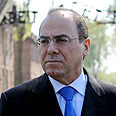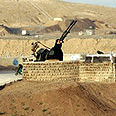

Speaking at a cornerstone ceremony for the first housing project for career officers in the southern community of Omer, the minister said that the international community "must make an unequivocal decision to act against Iran, which is deceiving the entire world."
According to reports from the past few weeks, the United Nations Security Council is expected to decide in February whether to impose additional sanctions on Iran over its unwillingness to reach an international solution in regards to its nuclear program, and its refusal to suspend the uranium enrichment process, which continues all along in a special facility near the city of Natanz.
German Chancellor Angela Merkel promised President Shimon Peres last week that sanctions would be imposed as early as February. She clarified that she planned to recruit the support of China and Russia – the two main opposers among the permanent Security Council members.
On Monday, February 1, the Security Council's relieving president position was turned over to France – one of the powers leading the battle in favor of sanctions on Iran.
French Foreign Minister Bernard Kouchner estimated Sunday that the conflict between Washington and Beijing regarding the sale of American weapons to Taiwan may make it harder to impose new sanctions on Iran, which require the support of all members if the UN's Security Council. Kouchner noted that it was imperative to have the Chinese on board in dealing with the Islamic Republic, adding that he believed the Beijing government will not thwart an initiative to punish Tehran.
The European Union's new foreign affairs chief said on Sunday she was disappointed with Iran's failure to engage in talks over its nuclear program and the next step should be to refer it to the UN Security Council
"We are worried about what's happening in Iran. I'm disappointed at the failure of Iran to accept the dialogue and we now need to look again at what needs to happen there," Catherine Ashton told Sky News in an interview.
'We'll must bring people to the Negev'
Speaking in Omer, the vice premier also addressed the issue of a new international airport, saying he supports its establishment in the Negev and not in northern Israel. According to Shalom, "All the conditions are mature" for building the airport in Nevatim, while environmental organizations are firmly against building it in Megido.
As for the housing project, Shalom said this was "the opening shot for the IDF's move south." According to the minister, "Thousands of soldiers will arrive here to take part in courses, but our goal is also to inhabit the Negev with 300,000 more people.
"The distance between the Negev and central Israel has become shorter thanks to advanced trains in mid 2010 and Route 6, which make the distance between the Negev and the center significantly shorter – and vice versa," he said. "We must work to bring people to the Negev."
Tova Dadon and Reuters contributed to this report















